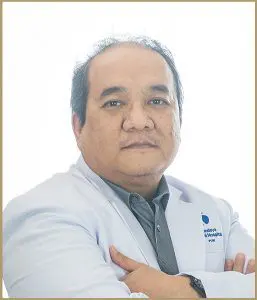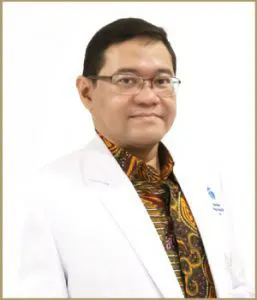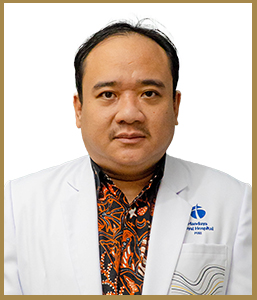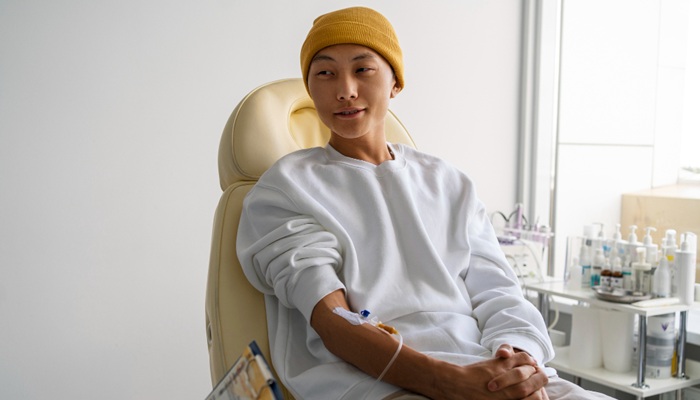Targeted therapy is a form of cancer treatment that works by attacking features, changes, mutations, or certain substances found inside or on the surface of cancer cells. With a more specific approach, targeted therapy provides more precise treatment according to the characteristics of cancer cells in each patient. Targeted therapy is also known as directed therapy.
There are various types of targeted therapy designed to stop the growth and spread of cancer cells, while minimizing damage to healthy normal cells. Each type of therapy works differently, such as targeting specific biomarkers (genes and proteins that help cancer cells survive and grow), altering the tissue or environment where cancer cells develop, or attacking other types of cells that support cancer growth, such as blood vessel cells.
RS Mandaya Royal Puri has a team of internal medicine specialists, consultants in hematology-medical oncology (KHOM), who are skilled and experienced in performing this type of cancer treatment. With the support of modern equipment and services, RS Mandaya Royal Puri provides comprehensive and thorough cancer treatment.
Contents
What are the goals of targeted therapy in cancer treatment?
The following are the goals of targeted therapy in cancer treatment:
1. Curing cancer
If possible, the main goal of targeted therapy is to cure cancer and completely destroy it so that it does not return. However, the term “cure” is often avoided because it takes years to truly ensure the cancer is completely gone. The hope of directed therapy is certainly cure, although it is not always achievable.
2. Controlling cancer
If a cure is not possible, targeted therapy can be used to slow cancer growth or shrink it. This can help patients feel better and live longer. Cancer may not disappear completely, but it can often be controlled and managed like a chronic disease, such as heart disease or diabetes. Sometimes cancer may disappear temporarily but has the potential to return in the future.
3. Relieving symptoms
Targeted therapy can also be used to help patients feel more comfortable (palliative care). This therapy can be given even if the cancer has spread or cannot be controlled, with the goal of improving patient comfort and quality of life. For example, helping shrink a tumor that is pressing on an area and causing pain.
How is targeted therapy performed?
Most people receive targeted therapy through infusion or injection at a clinic or hospital, or by taking medication at home. Each type has its own routine, side effects, and safety steps.
1. Intravenous (IV)
Many types of directed therapy are given through infusion. The process is similar to chemotherapy infusion. If you receive a combination of chemotherapy and targeted therapy, both can be given simultaneously or on a separate schedule, depending on the treatment plan.
2. Subcutaneous
Subcutaneous targeted therapy (SC or SQ) is given by injection into the subcutaneous tissue (fat tissue) just under the skin (similar to subcutaneous chemotherapy). Not all types of targeted therapy can be given through SQ injection.
Administration of targeted therapy this way is equally effective, but faster and does not require an IV infusion.
3. Oral
There is also oral targeted therapy that can be taken in the form of pills, capsules, or liquid. This therapy can be given in cycles or rounds and is often combined with traditional chemotherapy.
Since oral targeted therapy is taken at home, it is important to understand exactly how and when to take it, as well as the steps to take if problems arise.
What types of cancer can be treated with targeted therapy?
Targeted therapy is not yet available for all types of cancer. The biomarkers (gene, protein, and other changes) targeted by this therapy can differ in each type of cancer, even in people with the same type of cancer. Targeted therapy is most commonly used for:
- Breast cancer
- Colorectal cancer
- Gastrointestinal stromal tumors
- Leukemia (acute, chronic, or certain subtypes)
- Liver cancer (hepatocellular)
- Lung cancer
- Melanoma
- Ovarian cancer
- Pancreatic cancer
- Prostate cancer
- Stomach cancer
- Thyroid cancer
Biomarker tests are often required to determine whether your cancer may respond to targeted therapy.
Does targeted therapy cause side effects?
The side effects of targeted therapy may vary, but some of the most common include:
- Bleeding in the stomach or intestines, which may cause changes in stool such as bright red blood or black, tarry stools
- Blood clotting
- Diarrhea
- Dry skin or rash
- Increased liver enzymes
- Heart problems, such as arrhythmias and cardiotoxicity
- High blood pressure (hypertension)
- Hair color loss
- Pulmonary fibrosis
- Slow-healing wounds (incisions)
KHOM doctors team at RS Mandaya Puri, experts in targeted therapy
RS Mandaya Royal Puri has a KHOM doctors team who are experts in performing targeted therapy for various cancers, including blood cancer.
The following are the KHOM doctors at RS Mandaya Puri:
1. dr. Toman T.J Lumban Toruan, Sp.PD-KHOM

dr. Toman T.J Lumban Toruan is an internal medicine specialist with a concentration in Hematology-Medical Oncology (KHOM). He completed his general medical education at Universitas Indonesia before continuing his specialization in Hematology-Medical Oncology at RS Cipto Mangunkusumo, Faculty of Medicine, Universitas Indonesia. In addition,
dr. Toman also pursued an Honorary Fellowship (Clinical Observership) at the Department of Hematology, National University Hospital, Singapore.
dr. Toman’s expertise includes various cancer treatment methods, ranging from chemotherapy, immunotherapy, targeted therapy, to apheresis procedures.
Practice schedule at RS Mandaya Royal Puri:
- Tuesday: 12.00 – 15.00 WIB
- Thursday: 12.00 – 15.00 WIB
2. dr. Alvin Tagor Harahap, Sp.PD-KHOM

dr. Alvin Tagor Harahap is an internal medicine specialist focusing on Hematology-Medical Oncology. He completed his general medical education and internal medicine specialization at the Faculty of Medicine, Universitas Indonesia, then continued his education as a Hematology-Medical Oncology Consultant at the same university.
With his competence, dr. Alvin treats various cases of blood cancer and hematological disorders through chemotherapy, immunotherapy, targeted therapy, and apheresis. As part of the Mandaya KHOM team, he provides modern oncology services in accordance with the latest medical standards.
Practice schedule at RS Mandaya Royal Puri:
- Wednesday: 18.00 – 20.00 WIB
- Saturday: 10.00 – 12.00 WIB
3. Prof. DR. Aru W. Sudoyo, Sp.PD-KHOM, FINASIM, FACP

Prof. DR. Aru W. Sudoyo is known as one of the leading hematology and oncology experts in Indonesia. He completed his general medical education, internal medicine specialization, and Hematology-Medical Oncology consultant training at the Faculty of Medicine, Universitas Indonesia, while also earning his doctoral degree at the same institution.
As both an academic and practitioner, Prof. Aru has made significant contributions to the development of cancer care in Indonesia. He is proficient in various modern therapies, including chemotherapy, immunotherapy, targeted therapy, bone marrow transplant, and CAR-T cell therapy. With his extensive experience and international reputation, Prof. Aru provides high-quality care at RS Mandaya Royal Puri.
Practice schedule at RS Mandaya Royal Puri:
-
Wednesday: 08.00 – 12.00 WIB
4. Dr. dr. Andree Kurniawan, Sp.PD-KHOM, FINASIM

Dr. dr. Andree Kurniawan is an internal medicine specialist, consultant in Hematology-Medical Oncology, with extensive experience in treating patients with blood cancer and hematological disorders. He uses various treatment methods, including chemotherapy, immunotherapy, and targeted therapy.
With a personalized approach, dr. Andree tailors each treatment method to the patient’s medical condition, resulting in more optimal outcomes.
Practice schedule at RS Mandaya Royal Puri:
- Monday: 17.00 – 19.00 WIB
- Thursday: 17.00 – 19.00 WIB
5. dr. Nia Novianti Siregar, Sp.PD, Subsp.H-Onk.M (K)

dr. Nia Novianti Siregar is an internal medicine specialist with a subspecialty in Hematology-Medical Oncology (K). She has experience handling various complex cases of blood cancer and hematological disorders.
In addition to chemotherapy, dr. Nia is also proficient in immunotherapy and targeted therapy, with a comprehensive approach that always follows the latest developments in hematology-oncology.
Practice schedule at RS Mandaya Royal Puri:
- Tuesday: 17.00 – 20.00 WIB
- Friday: 17.00 – 20.00 WIB
To make your visit easier to RS Mandaya Royal Puri, use the Chat via WhatsApp, Book Appointment, or the Care Dokter app, which can be downloaded from Google Play and the App Store, to simplify your visit, check queue numbers, and get complete information.



